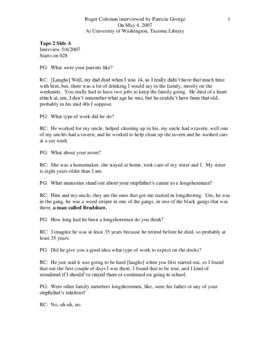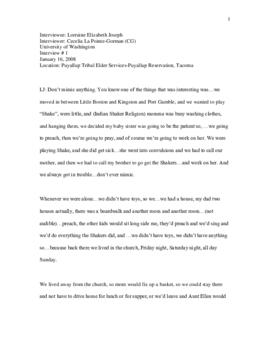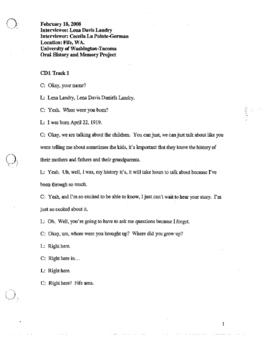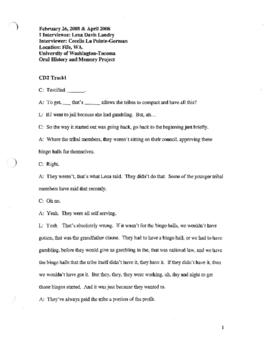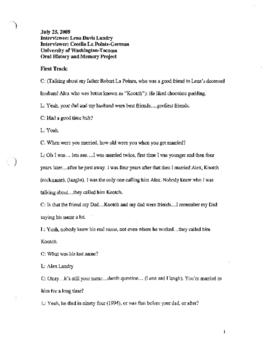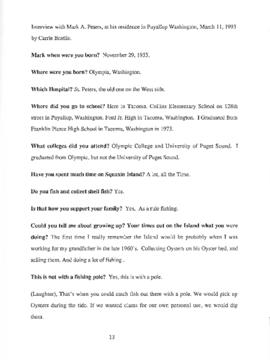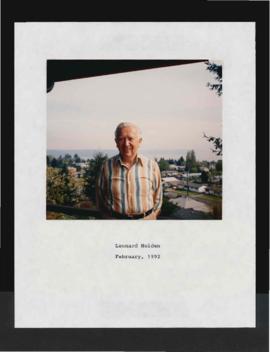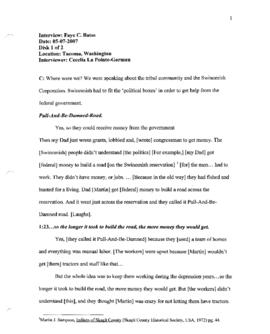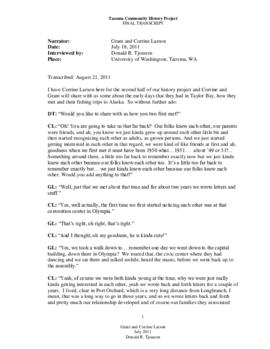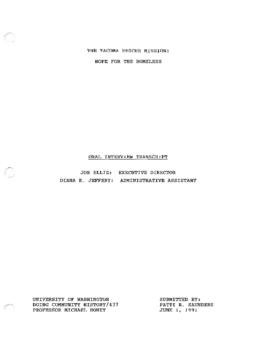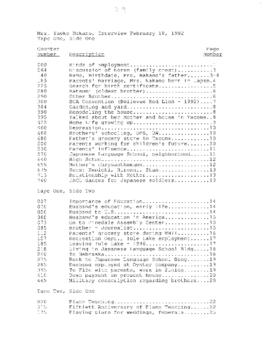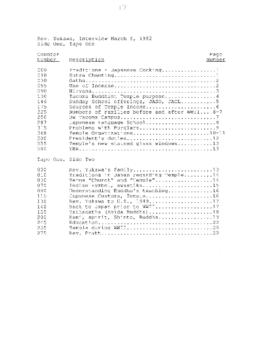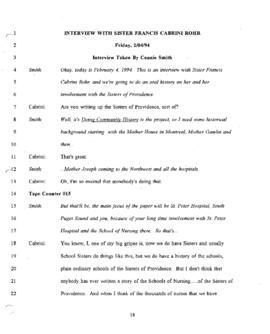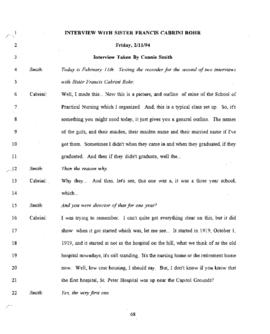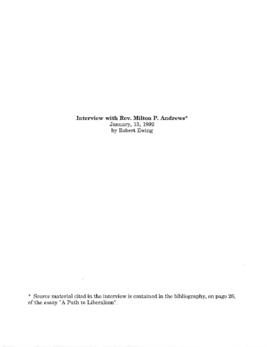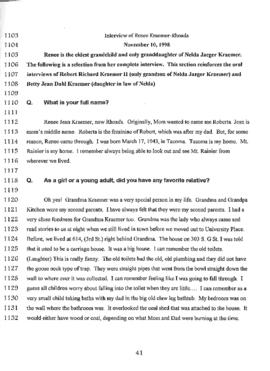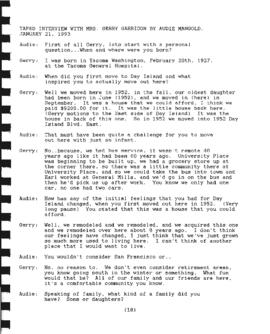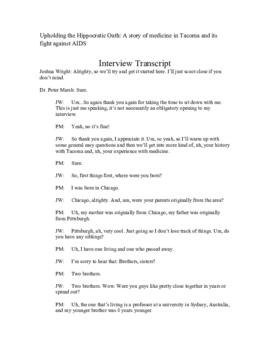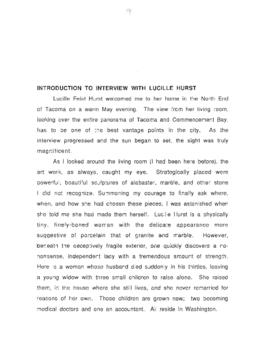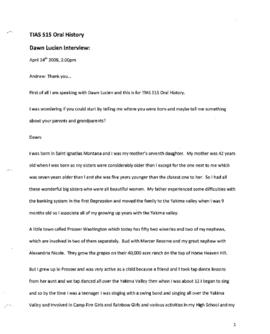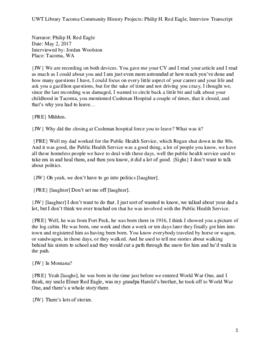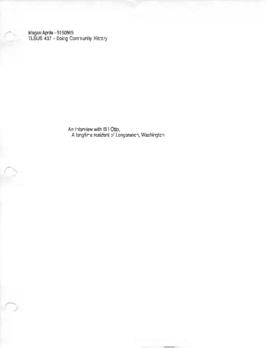Showing 230 results
Collections153 results with digital objects Show results with digital objects
Ramona Bennett: Puyallup Tribal Indian Activist
- File
- 2009
Oral history interviews with Ramona Bennett and Suzette Mills by Cecelia La Pointe-Gorman, Matt Nagel, Cheryl Milas, Clare Johnson, Dawn Quinn, David Octuck, and Brent Anderson conducted May-September 2009. Tribal leader Ramona Bennett discusses her forty years of advocacy work on behalf of the Puyallup Tribe and the Pacific Northwest Native American community. The interviews focus in particular on Bennetts time on the Puyallup Tribal Council (1968-1979), during which she campaigned for much-needed social and healthcare services. Other areas of focus include Bennetts involvement with the fish-in movement and the history of Cushman Hospital.
Tacoma - 1717 South Fawcett, Tacoma, WA: A Brief Historical Perspective
- File
- 1992
Oral history interviews with Kosho Yukawa and Yaeko Nakano by Susan Stout conducted February-March 1992. This project includes interviews with the then minister of Tacoma Buddhist Temple, Reverend Kosho Yukawa, and Mrs. Yaeko Nakano, a longtime member of Tacoma Buddhist Temple and its principal organist. Yukawa describes Buddhist religious practices, the activities of the Temple and its various organizations, his family, and Sunya Pratt. Nakano discusses her family life growing up as a Japanese American in Tacoma, Washington during the Depression, her education, internment experiences during the Second World War, her training and work as a musician, and her involvement with the Tacoma Buddhist Temple in many capacities.
- Series
Hillside Community Church: A Path to Liberalism
- Item
- 1992
Oral history interview with Milton P. Andrews by Robert Ewing conducted 1/13/1992. Andrews discusses his experiences growing up as the son of a fundamental (Free Methodist Church) preacher in Missouri, his education, religious training, and his own spiritual and philosophical shift to a more progressive brand of religion and into activism for social justice. Andrews details his controversial tenure as the leader of several churches in Ohio, New York and Washington State, including Epworth Lesourd Methodist Church in Tacoma, where his stance against the Vietnam War led to his forced resignation in 1970. The interview only briefly touches on Andrews's involvement with the Hillside Community Church.
A Woman of Firsts: Nelda Jaeger-Kraemer - Her Life as a Citizen of Tacoma for Ninety-two Years
- Item
- 1998
Oral history interviews with Robert Richard Kraemer, Jr; Betty Kraemer; and Renee Kraemer-Rhoads by Kathryn S. Held conducted 11/1998. Robert Richard Kraemer Jr, Betty Dahl Kraemer, and Renee Kraemer-Rhoads present their family history and share stories about the several generations of Kraemers, Jaegers, and Kitchens who have lived in the Tacoma area. Particular focus is given to Nelda Jaeger-Kraemer, one of the first women to graduate from the University of Washington Law School.
- Series
Upholding the Hippocratic Oath: A Story of Medicine in Tacoma and its Fight Against AIDS
- Item
- 2015
Oral history interview with Peter Marsh by Joshua Wright conducted 05/28/2015. From the very beginning, Tacoma was met with illness in the form of typhoid. Disease would continue to wage war against the residents of the City of Destiny until the Fannie C. Paddock Memorial Hospital and St. Joseph Hospital were built in 1882 and 1891, respectively. Both organizations developed meaningful relationships with their community and ignited a behind-the-scenes competition which would benefit both patient and physician. Almost 100 years later, Tacoma was cared for predominantly by primary care physicians. It had just started to see an influx of medical specialists via Madigan Army Medical Center when the city was hit by HIV in 1983. With no effective cure at the time, Tacoma did its best to cope with the disease and its associated complications, and the infectious disease specialists were on the forefront. One of these few physicians was Dr. Peter Marsh. Born in Chicago in 1949, he was inspired to become a doctor as a young boy by the Dr. Kildare film series. Arriving in Tacoma in 1981, he would find himself in the middle of handling the AIDS epidemic, supporting patients as best as he could before they succumbed to the disease; that is, until the introduction of antiretroviral medications. Now able to effectively cure patients, Dr. Marsh found new life in his work and continued to serve his community until retirement in 2015. With the epidemic under control, Tacoma still utilizes what it learned from that chaotic era to stand prepared for anything thrown its way.
Dawn Lucien: Civic Pride and the Ebb and Flow of Tacomas Development
- File
- 2009
Oral history interview with Dawn Lucien by Andrew Fry conducted April-May 2009. Dawn Lucien, a lifelong civic activist and former Tacoma City Council member, examines some of the major political and economic decisions that have affected Tacomas development, particularly that of the downtown core. Areas of focus include the downtown decline following the construction of the Tacoma Mall; Luciens efforts to restore the Pantages Theater and revitalize the Broadway District; and her involvement with the South Puget Sound Education Council, which helped to establish the Tacoma branch of the University of Washington.
Covid 19- The resilience of everyday People
- File
- 2020
Oral history interviews with Zakariyya Alim and Mary Thompson by Gudrun Krause conducted 05/04/2020. Polio, Scarlet fever, Spanish fly, H1N1, Whooping cough, HIV, and now Covid-19 to name just a few pandemics that haunted the USA. All of them spread death and misery throughout the population. This essay takes a look at ordinary people and how they dealt with natural and man- made crises during their lifetime and how they are coping now with the threat of Covid-19. Two people are interviewed for this project, an African American man from Baltimore MD and a White American woman with Scottish heritage from a rural area in WA State. Due to a historic turn of the event, the conclusion is looking into the equal rights protests that are going on all over the country and the world.
Civil Rights and Civic Pride: The Story of Harold G. Moss and the City of Tacoma
- File
- 1993
Oral history interview with Harold G. Moss by Alison H. Sonntag conducted January-February 1993. Harold Moss reflects on his forty years of social activism in the Tacoma community and shares stories about the citys gradual shift toward racial integration and equality during the 1950s, 60s, and 70s. He also discusses his childhood in Detroit, his early campaigns for public office, and his eventual appointment to the city council in 1970, earning him the distinction of being the first African-American to hold a public office in Pierce County. An addendum includes quotations from Mosss inaugural speech after being appointed Mayor of Tacoma in 1994, the first African-American to serve in that capacity.
- Item
- 2017
Oral history interview with Philip H. Red Eagle by Jordan Woolston conducted 05/02/2017. Philip H. Red Eagle was born in 1945 in Tacoma, Washington. His mother, Marian Steilacoom, of Salish decent, was born near Port Angeles, Washington. Philip's father, Philip Red Eagle, a member of the Dakota Tribe, was born near the Missouri River on the Fort Peck Indian Reservation in Montana. Phillip spent the first fourteen years of his life in Tacoma, attending Stanley and McCarver schools before moving to Sitka, Alaska with his family in 1959. Philip joined the Navy shortly after graduating from high school, serving in Vietnam for five years from 1969-1973. After Vietnam, Philip returned to Washington and began undergraduate studies at the University of Washington where he earned two bachelor's degrees. The return to civilian life after the war affected Philip and he struggled with PTSD and related issues like depression and insomnia. Philip found that art, writing, and taking part in the revival of his culture helped him confront his PTSD and over the last 30 years Philip has contributed greatly to the revival and expansion of Indigenous culture in the Pacific Northwest.
A Brief Study of Land Use by Indian and Pioneer Communities on the Key Peninsula
- Item
- 1991
Oral history interview with Bill Otto by Megan Aprile conducted 05/06/1991. The interview discusses Bill Otto's family and German heritage, his work in the lumber industry and as a family farmer. He also describes childhood activities in Longbranch, Washington, including playing baseball on a championship youth league baseball team in Pierce County.
